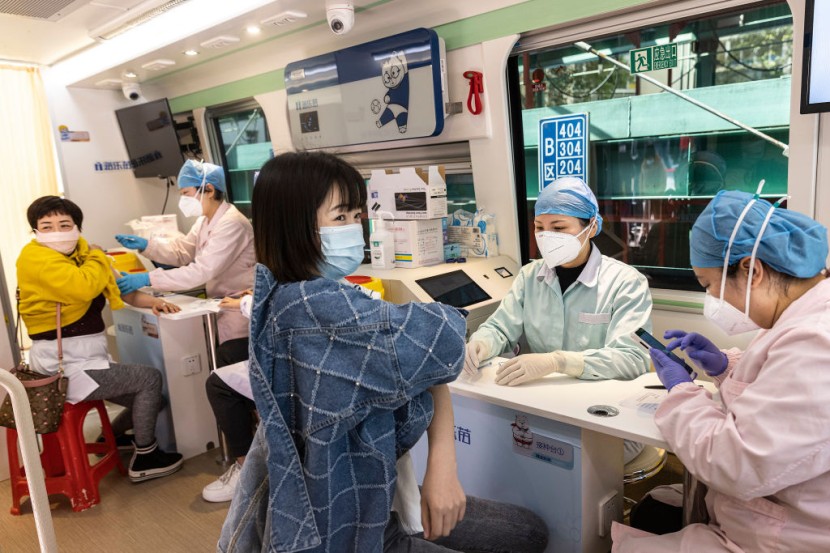China has acknowledged that its COVID-19 vaccines are only 50 percent effective, potentially slowing the global fight against the virus. Gao Fu, the head of the Chinese Center for Disease Control and Prevention, admitted that the country's COVID-19 vaccines "don't have very high protection rates" against coronavirus symptoms in an exceedingly unusual admission. They are used in at least 45 different countries.
China admitted that its COVID-19 vaccines are less effective

He did not go in-depth, but an analysis from the University of Chile showed that China's CoronaVac vaccine was just 3 percent effective in the 28 days between the first and second doses, increasing to 56.5 percent two weeks later. This may explain why, despite having one of the world's highest vaccine rates, Chile is experiencing a major COVID-19 outbreak.
Hundreds of millions of jabs made by state-owned companies have been shipped to Asia, Africa, Latin America, Hungary, and Turkey. China is now discussing using new jabs, according to Gao. According to the Associated Press, vaccines produced by two state-owned drug companies, Sinovac and Sinopharm, have been exported to at least 45 countries, mainly in Asia, Africa, and Latin America.
However, some European countries, such as Hungary and Turkey, have used Chinese vaccines. These vaccines are based on an inactivated virus, equivalent to the Oxford/AstraZeneca vaccine, but they do not target COVID-19's distinctive "spike" protein.
Experts believe that combining vaccines or increasing doses may improve their efficacy, Daily Mail reported. Researchers in the United Kingdom is looking at the possibility of combining the Oxford/AstraZeneca and Pfizer/BioNTech vaccines.
Due to evidence of insufficient antibody levels, the UAE recently experimented with giving three shots of the Chinese Sinopharm vaccine instead of two. Researchers in Brazil discovered that the Sinovac vaccine's efficacy in avoiding symptomatic infections following both doses was as low as 50.4 percent.
The Pfizer/BioNTech vaccine, on the other hand, is 97 percent effective. According to a study conducted by the University of Chile, effectiveness was just 3 percent in the 28 days between the first and second doses of the China-made vaccines.
Health Official Admits Having No Idea AstraZeneca COVID-19 Vaccine Causes Blood Clots
China's COVID-19 vaccines have low efficacy rates
China has four domestic vaccines that have been approved for general use, with an official estimating that the country will deliver 3 billion doses by the end of the year. In Brazilian clinical trials, a COVID-19 vaccine developed by China's Sinovac was found to have an efficacy rate of slightly more than 50 percent.
According to a separate study conducted in Turkey, it was 83.5 percent effective. Sinopharm, a Chinese pharmaceutical company, has not published any comprehensive efficacy results on its vaccines.
Based on preliminary findings, it claims that two vaccines produced by its units are 79.4 percent and 72.5 percent effective, respectively. In March, a World Health Organization (WHO) panel said that both vaccine makers had provided data on their COVID-19 vaccines showing efficacy levels in line with those expected by the WHO. China has exported millions of vaccines, and officials and state media have defended the vaccines vigorously while questioning other vaccines' efficacy and logistics, as per Reuters.
WHO, Others, Warn Using Ivermectin as Treatment to COVID-19
China considers mixing its COVID-19 vaccines
According to the country's top disease control official, China is considering combining its COVID-19 vaccines to improve their efficacy. Chinese vaccines lag behind others in terms of effectiveness, including Pfizer and Moderna, but have less demanding storage requirements.
Hungary, Serbia, Turkey, and Brazil are among the countries that use Chinese vaccines, including those produced by Sinovac, a private enterprise, and Sinopharm, a state-owned company. Hundreds of millions of doses have been released worldwide in an attempt to cast doubt on the efficacy of the Pfizer-BioNTech vaccine, which was developed using the previously experimental messenger RNA, or mRNA, method.
Officials did not directly react to concerns about Gao's remark or future improvements in official planning at a press conference on Sunday, The Independent reported. Wang Huaqing, another CDC official, said that developers are working on mRNA-based vaccines.
Researchers in the United Kingdom are looking at mixing the Pfizer-BioNTech vaccine with the conventional AstraZeneca vaccine. Beijing has yet to allow the use of any foreign vaccines in the country. As of April 2, 34 million Chinese citizens had received both of the mandatory vaccine doses, while 65 million had received only one.
China Reportedly Targets Christians By Detaining Them in Secret Brainwashing Facilities
© 2026 HNGN, All rights reserved. Do not reproduce without permission.








